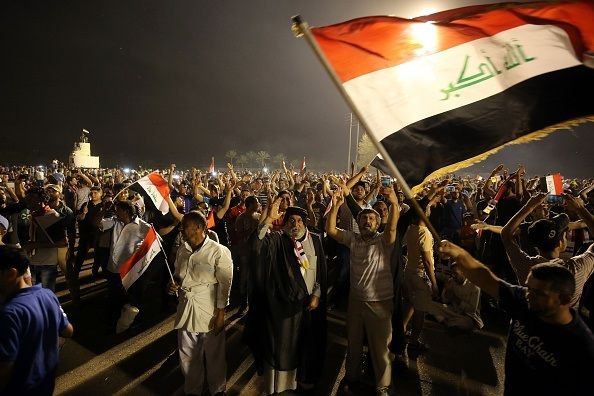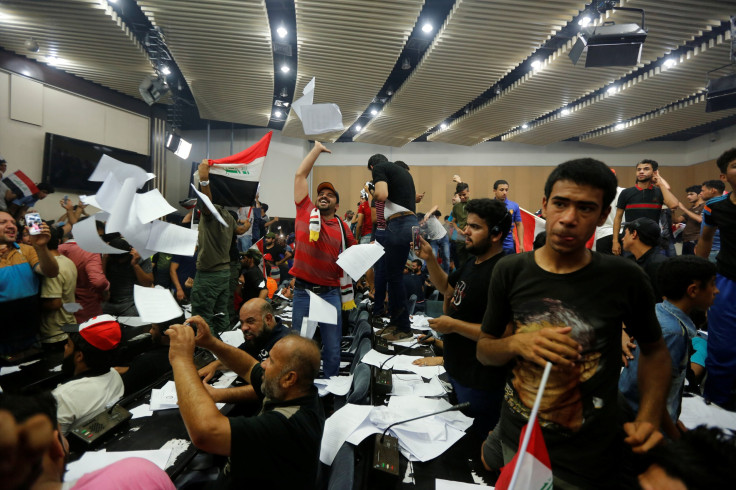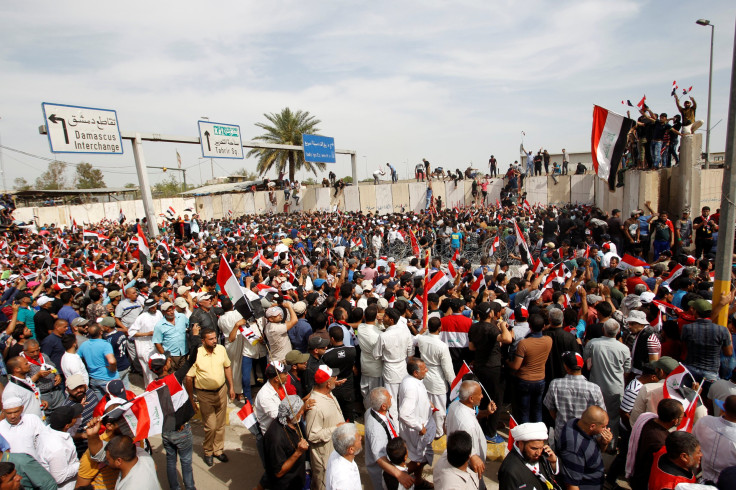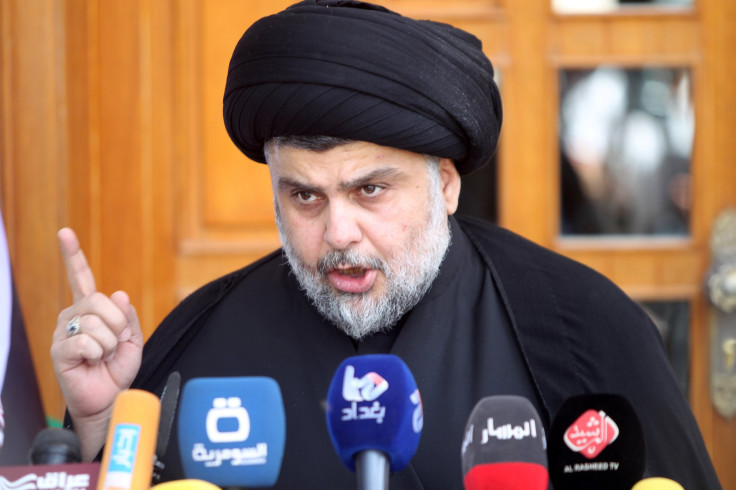Iraq Protests Update: Everything You Need To Know About The Civil Unrest In Baghdad’s Green Zone

UPDATE: 3:53 p.m. EDT — Iraqi politicians who were trapped as angry protesters stormed the Parliament in Baghdad hours earlier have been freed, Rudaw reported Saturday. Around 70 of them, including both Kurdish and Sunni parliamentary members, arrived to the semiautonomous Kurdish region, where some voiced concerns to reporters over the latest developments in the capital city.
“[Supporters of Shiite cleric Muqtada al-Sadr] constitute 8 to 9 percent of the Parliament, and they want to impose their idea on the rest of the Parliament, which is impossible,” Khasro Goran, a member of the Kurdistan Democratic Party, said as he landed at the Erbil International Airport. “They have scared people many times saying that they will attack the Parliament.”
The protests come as the prominent cleric has called for a major government overhaul amid rising complaints of rampant corruption. The protesters slowly left the Parliament building Saturday and set up tents nearby, as some chanted, “The cowards ran away!” referring to the fleeing politicians, Reuters reported.
Around a dozen people were wounded Saturday, the news agency reported, quoting the police.
Original story:
Protesters stormed Baghdad's highly fortified Green Zone, overtook the country's Parliament and beat lawmakers with Iraqi flags as they hurried out the building Saturday. Outside the heavily guarded area, police fired tear gas at demonstrators, the streets into Baghdad were closed, and a state of emergency was declared. All the while, the country's prime minister, Haider al-Abadi, sought to assure his compatriots the situation was under control.
Reports indicated protesters were slowly leaving Parliament Saturday evening but continued camping outside. They were reportedly planning a sit-in by the Triumphal Arch at the center of the Green Zone.
The protests come as supporters of the prominent Shiite cleric Muqtada al-Sadr have demanded an overhaul in government amid growing anger over corruption. Under mounting pressure, Abadi has partially reshuffled the Parliament but has been set back by a deeply fractured and resistant government. Just moments before protesters stormed the Green Zone on Saturday, news broke that a vote to further change up the Parliament had been postponed until next week.

Abadi called on protesters to return to designated demonstration areas — though there was little sign they were obeying. Some called it a "revolution" and seemed resolute to push until they saw major changes.
“This is a new era in the history of Iraq,” a demonstrator yelled in the Parliament’s lobby, the Washington Post reported, citing footage on Iraqi television. “They have been robbing us for the past 13 years,” another activist said.
Many read into the protests as reaction to momentous failure in governance over the past decade. The Green Zone was set up to protect U.S. forces stationed in Iraq after the 2003 American invasion that ousted Sadam Hussein, and today it is the site of many Iraqi ministries and foreign embassies. For the Shiite activists, it has been portrayed as a bastion of corruption; about a mile away from the Parliament sits the U.S. Embassy.

Activists have demanded an end to the quota system that requires positions to be shared between sects, and Sadr has called for new technocrats to replace current ministers. Transparency International ranks Iraq as 161 of 168 countries in its 2015 corruption index.
U.S. and Iraqi officials alike have expressed concern that instability in Baghdad could hinder the fight against the Islamic State group. Yet the Shiite organizers, whose movement is harshly opposed to the Sunni extremist group, also known as ISIS, have directed protesters to remain peaceful. As some ransacked the Parliament, others tried to rein them in, yelling, "Peacefully, peacefully!"
The man behind the movement is a 42-year-old cleric who rose to prominence in 2003. His militia, the now-disbanded Mahdi Army, fought against U.S. troops and was faulted with further inflaming a sectarian conflict. But in recent years, as he has gone mostly quiet, also encouraging moderation and peace, and some of his followers have taken positions in Parliament. His current movement is popular particularly among the country's poorest Shiites.

Last month, Sadr entered the Green Zone on his own, instructing his supporters to remain peaceful outside its gates. A security official kissed his hand as he entered the area off limits to most Iraqis, underscoring the outspoken critic's widespread appeal. He warned then that his supporters would storm the area if the political demands were not met.
“What happened today was an explosion of the people,” said Hussain al-Sharifi, a parliamentarian with Sadr’s bloc, the Washington Post reported Saturday. “Today was an uprising, a revolution.”
© Copyright IBTimes 2025. All rights reserved.






















